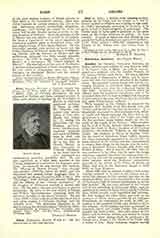

Alzog, JOHANN BAPTIST, a Catholic church historian, b. June 29, 1808, at Ohlau in Silesia; d. March 1, 1878, at Freiburg (Breisgau). He was educated at Breslau and Bonn, ordained a priest in 1834, made doctor of theology by the University of Munich in 1835, and appointed professor at Posen in 1836.He defended with ardor the Archbishop of that city, Martin von Dunin (q.v.), during his persecution by the Prussian government, became vicar-capitular, professor and regens at Hildesheim in 1845, and in 1853 was appointed to the chair of Church History in the University of Freiburg (Breisgau); at the same time he was appointed an ecclesiastical councilor (geistlicher Rat). He was also appointed, at a later date, member of the Vatican preparatory commission for dogmatic questions. In character he was amiable and virtuous. His “Manual of Church History” went through nine editions (1840-72) before his death, and was translated into several foreign languages (Eng. tr. by Pabisch and Byrne, Cincinnati, 1874, et swp.). His “Patrology” went through four editions (1866-84), and his edition of the “Oratio Apologetica” of St. Gregory of Nazianzus reached a second edition. He was also a frequent contributor to various periodicals. He wrote in the first edition of Wetzer and Welte’s “Kirchenlexikon” (Freiburg, 1854) the article on the office of the church historian. He also wrote (1857) a Latin treatise on the relation of Greek and Latin studies to Christian theology, and the valuable work: “Die deutschen Plenarien im 15 and zu Anfang des 16 Jahrhunderts” (Freiburg, 1874).
THOMAS J. SHAHAN

